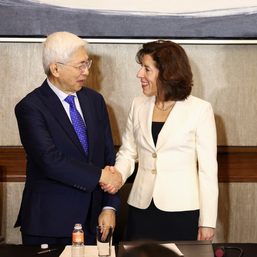SUMMARY
This is AI generated summarization, which may have errors. For context, always refer to the full article.
![[OPINION] De-weaponizing tax laws: Upholding press freedom and economic growth](https://www.rappler.com/tachyon/2023/10/tl-upholding-press-freedom-economic-growth.jpg)
The series of cases against Rappler, a Philippine company that fearlessly exposed the extrajudicial killings during former president Rodrigo Duterte’s war on drugs, shed light on how our laws can be weaponized to silence the critics of the President of the Philippines.
Among these cases were five tax evasion cases relating to the issuance of Philippine depositary receipts (PDRs) by Rappler Holdings Corporation (RHC) when it raised capital for its online media platform subsidiary, Rappler, Inc. (“RI”), by using the latter’s shares of stock as underlying assets for the PDRs.
The government alleged that RHC should have declared income and paid income tax on the difference between the par value of the RI shares and issue price of the PDRs. The government also contended that RHC should be considered dealer in securities and should have declared as “VATable” transactions and paid the corresponding value added tax (VAT) when it issued the PDRs on separate occasions to two American companies.
These tax cases as well as several non-taxes were filed against the Rappler group on the back of Duterte’s singling out of Rappler in his 2017 State of the Nation Address.
The government ordered the filing of cases, even if other Philippine companies had raised capital in the past through the issuance of depositary receipts with no issue from the government. Some of these depositary receipts were even listed in the Philippine Stock Exchange and New York Stock Exchange. These included depositary receipts issued by the Philippine Long Distance Telephone Company (PLDT), Globe Telecom, GMA and ABS-CBN, all of which were backed up by shares of stock as underlying assets. Notably, GMA and ABS-CBN were media companies.
Many observers viewed the series of cases brought against Rappler as a veiled attempt to stifle independent media. By challenging Rappler’s legitimacy and principally targeting its principal founder, Maria Ressa, the government raised concerns about our country’s commitment to press freedom and the free exchange of ideas.
Thankfully, the tax courts acquitted Rappler and its officers of the charges, thereby de-weaponizing the tax laws. These verdicts underscore the importance of an independent and objective judiciary in upholding the rule of law and protecting press freedom. These values are vital to a well-functioning democracy, ensuring transparency and safeguarding the rights of citizens.
Had the tax courts convicted Ressa and Rappler, the verdicts would have set an extremely bad precedent for the Philippine capital markets. In a typical capital fund-raising activity, the capital raised by a company is inevitably higher than the par value of its shares of stock. Just imagine a company that needs to raise capital for its business through a private placement or public offering of its shares of stock. If we are to follow the BIR’s theory in the Rappler cases, the company will be required to pay 25% income tax and 12% VAT or a whopping 37% tax. If they don’t, their directors and officers will go to jail for tax evasion.
Who among our businesses will raise capital in the Philippines? What will happen to our capital markets, businesses and economy in general?
The acquittal of Rappler and Maria Ressa not only vindicates their journalistic integrity but also symbolizes a triumph for independent media and the economy. It serves as an indication that our courts will not allow our tax laws to be employed as weapons to suppress dissent or blur our country’s business landscape.
The verdicts of acquittal have reaffirmed the judiciary’s commitment to a fair and supportive environment for businesses. In the end, the acquittal is not only a victory for Nobel prize laureate Maria Ressa and her colleagues in Rappler but also for the Philippine capital markets and economy. – Rappler.com
The author is a senior legal counsel of ACCRALAW and Rappler’s lead counsel for the series of cases filed against it.
Add a comment
How does this make you feel?


![[ANALYSIS] Not all REITs are created equal](https://www.rappler.com/tachyon/2024/06/tl-not-all-reits-are-created-equal-06012024.jpg?resize=257%2C257&crop=233px%2C0px%2C720px%2C720px)

![[ANALYSIS] Search for stocks that continue to sizzle](https://www.rappler.com/tachyon/2024/04/search-stocks-that-sizzle-April-5-2024.jpg?resize=257%2C257&crop_strategy=attention)











![[OPINION] You don’t always need a journalism degree to be a journalist](https://www.rappler.com/tachyon/2024/06/jed-harme-fellowship-essay-june-19-2024.jpg?resize=257%2C257&crop=287px%2C0px%2C720px%2C720px)












There are no comments yet. Add your comment to start the conversation.